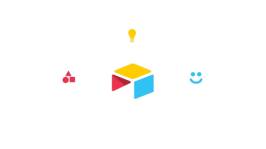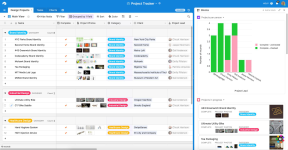Airtable
_main features
At first glance, Airtable looks a lot like a spreadsheet, but it's much more powerful. Airtable's building blocks enable teams to model the things they work on, define relationships between things, and create views explicitly tailored for their type of work.
Airtable allows teams to adapt their software when markets evolve, or goals change. it increases agility by providing transparency and visibility to collaborators and managers. Best of all, it allows teams to solve a broad set of use cases without IT resources.
_in practice
We at Codeless Factory often use Airtable as a database programme because of the configurability and connectability. The tool is very user-friendly and allows for quickly setting up relational databases with formulas, different view types, and great automations. Airtable has unfolded itself as a very versitale and powerful tool within the the world of No-code solutions. It combines the simplicity of a spreadsheet with the complexity of a database, making it an indispensible tool for both beginners and professionals. It does not matter if you are a projectmanager, a marketeer, or a smaller entrepeneur, Airtable can transfrom the way you manage data.
What is Airtable?
Airtable functions as a hybrid between a spreadsheet and a database. It allows you to collect, store, and manipulate data in an organised manner. With its user-friendly interface you can easily create tables, sort and filter data, and even manage more complex projects. What makes airtable unique is that it provides you with the flexibility of a spreadsheet along with the power of a database.
The power of Airtable in datamanagement
Airtable excels in its adaptability and versitility. Here are some key features:
Flexible data organization
Advantages: Airtable allows you to view data in various ways, such as grids, calenders, kanban boards, and more. This makes it easy to customize your data to meet specific needs.
Disadvantages: For new users, the multitude of customization options can be overwhelming at first.
Automation and integrations
Advantages: Airtable can be intergrated with numerous other applications and services, enabling the automation of workflows and the synchronization of data across different platforms.
Disadvantages: It requires some time and experimentation to learn how to leverage these integrations optimally.
Collaboration and sharing
Advantages: Airtable is designed for teamwork. You can easily share tables with teammembers, external partners, or even the public. This promomtes efficient collaboration and data exchange.
Disadvantages: Caregul control of access rights is necessary to prevent sensitive information from falling into the wrong hands.
Conclusion
Airtable is a powerful tool for anyone looking to streamline their data management, from planning content calenders to managing extensive projects. At Codeless Factory, we appreciate the flexibility and strength that Airtable provides, especially when combined with other No-code tools such as Glide. Whether you are just starting or already have experience, Airtable can be a valuable addition you your toolkit.

Virgin music is rocking it by unlocking artist data much fas...
// background
Website
https://www.airtable.com/Founded
2012
HQ location
San Francisco, California, United States
2.188 reviews on g2.com
// video's and images







